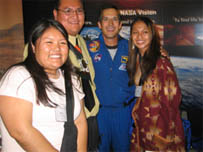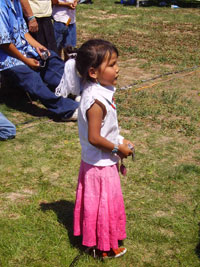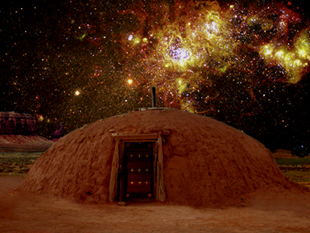Introduction

Astronaut John Herrington (Chickasaw) with AISES students in Anchorage, Alaska.
The Indigenous Education Institute (IEI) was created in 1995 as a non-profit 501(c)(3) institution with a mission to preserve, protect and apply traditional Indigenous knowledge in a contemporary setting, that of Indigenous peoples today, around the world. IEI has developed numerous projects that preserve traditional knowledge, protect the knowledge in terms of Indigenous protocol, and apply it to areas such as astronomy and other science disciplines.
IEI works closely with many Indigenous organizations and institutions and also with mainstream universities and K-12 schools. IEI personnel have given countless presentations around the world, in Australia, New Zealand, Norway, Ireland, Northern Ireland, England, Wales, Mexico, Hawaii, Alaska, and all through the continental United States. They have worked with many scientific organizations and institutions such as American Indian Science and Engineering Society (AISES), Canadian Aboriginal Science and Technology Society (CASTS), Goddard Space Flight Center (NASA), Space Sciences Laboratory at the University of California-Berkeley, Space Telescope Science Institute, and the Native Science Academy.
 Our Future – Navajo Child
Our Future – Navajo Child IEI is located in Friday Harbor, WA, with branch offices in Albuquerque, New Mexico, and Ganado, Arizona, and is composed of key administrators and board members from various Indian Nations. The Board of IEI is comprised of Indigenous leaders, with an International Advisory Board of noted individuals from all walks of life. IEI develops educational materials such as the
poster of the Dine (Navajo) Universe,
CD of Navajo Astronomy Stars Over Dine Bikeyah, and a cross cultural astronomy book:
Sharing the Skies: Navajo Astronomy – A Cross Cultural View, with comparisons of Navajo, Greek and NASA Space Science worldviews. IEI has developed a Dine Cosmic Model: “Strategic Planning and Evaluation in accordance with the Natural Order” as perceived by the Navajo. IEI is known for development of place-based curriculum relevant to Indigenous communities, such as Traditional Indigenous Geography, a traditional Indigenous introduction to GIS technology. Other university curricula include Indigenous Philosophy and Curriculum Development, a course developed and delivered from the University of Alaska, Fairbanks and Introduction to Indigenous Astronomy, an online course developed and currently delivered through the Department of Physics and Astronomy at Northern Arizona University. IEI specializes in the articulation of the differences and commonalities among Indigenous ways of knowing (native science) and Western Science and works to bring an awareness of Indigenous protocol for research and evaluation to the Western world.
The work of IEI is focused on the boundaries between traditional Indigenous science and western science, sometimes places of tension, but also places where the most fruitful exchange of knowledge can take place. The work of IEI is centered on the task of helping young native people find their own sense of self-identity and self-esteem in the world today, based on a firm foundation of thousands of years of cultural knowledge.
Welcome Message
 Polly Walker, Ph.D., ChairHuntingdon, PA,
Polly Walker, Ph.D., ChairHuntingdon, PA,
Cherokee
- by Polly Walker, Ph.D., Chair
- Indigenous Education Institute (IEI)
On behalf of the Indigenous Education Institute and the Board of Directors, I welcome you to our website. The Indigenous Education Institute (IEI) is an Indigenous-based organization whose work is designed to revitalize and engage Indigenous knowledge in contemporary processes and projects. IEI has been a leader in creating collaborative and dialogical frameworks for working with Indigenous science and Western science in communities, national and international settings. Although strongly focused on Native science, IEI’s programs are also forms of peacemaking – they are restoring measures of respect for, and acknowledgement of, Indigenous ways of knowing that were suppressed and marginalized during colonization. Now, in part through the work of IEI, Indigenous ways of knowing are now more widely recognized as being rigorous knowledge systems in their own right that have significant value in both Indigenous and Western societies.
Again, welcome. We hope you will visit IEI’s website often and follow us as we progress our goals and develop new programs and partnerships.
Mission and Goals
The Indigenous Education Institute (IEI) was created for the preservation and contemporary application of ancient Indigenous traditional knowledge
The fundamental goals of the institute are:
- To initiate and maintain collaborative research involving traditional knowledge holders
- To organize, articulate, and develop strategic and realistic application of the research to Indigenous education in order to provide cultural enrichment and empowerment to succeeding generations
- To preserve and maintain the diversity of Indigenous languages and cultures
- To enhance recognition of Indigenous science, in juxtaposition with western science, through processes that respect the honor and integrity of both ways of knowing
- To research and develop relevant systems of Indigenous strategic planning and evaluation, to enhance organizational effectiveness
- To support Indigenous communities in the research of their own knowledge and needs, enabling responsible capacity building to effect transformational and sustainable change
- To promote global networking among Indigenous communities to enhance the awareness and inter-relationships of Indigenous ways of knowing
- To support responsible stewardship for Mother Earth and the Cosmic Order
The mission and goals were developed in order to provide awareness of the importance of cultural and linguistic diversity in the world today.Cultural and linguistic diversity provide strength and richness to individuals and nations.Indigenous ways of knowing contain knowledge that can provide greater sustainability and stewardship of the earth and cosmos, leading to a harmonious, balanced future.
 Navajo Hogan – photo by Nancy Maryboy
Navajo Hogan – photo by Nancy Maryboyand Troy Cline
Memberships and Affiliations, Past and Present
- AISES – American Indian Science and Engineering Society
- AIHEC – American Indian Higher Education Consortium
- ASCD – Association for Supervision and Curriculum Development
- ASP – Astronomical Society of the Pacific
- IAIA – Institute of American Indian Arts
- NIEA – National Indian Education Association
- NMAI – Smithsonian National Museum of the American Indian
- SACNAS – Society for the Advancement of Chicanos and Native Americans in Science
- WINHEC – World Indigenous Nations Higher Education Consortium
- WIPCE – World Indigenous Peoples Conference on Education
President’s Corner
 Nancy Maryboy, Ph.D.Friday Harbor, WA,
Nancy Maryboy, Ph.D.Friday Harbor, WA,
Cherokee / Navajo
- by Nancy Maryboy, Ph.D., President
- Indigenous Education Institute (IEI)
Welcome to the IEI website! It is a pleasure to invite you to browse through our newly updated website. I want to express my deep gratitude to our Webmaster, Christopher Teren, for his patience and leadership in this endeavor.
As you will see, IEI is involved in a number of projects, all chosen in alignment with our mission and goals. We have chosen to emphasize the use of traditional Indigenous knowledge as it relates to sustainability and balance, or as Navajos might say Hozho. We believe that Indigenous peoples have succeeded in keeping Mother Earth and Father Sky in balance for thousands of years. Now, as global issues such as climate change, increasing ocean acidification, toxic waters, air pollution, and many others, point out the need for strategic and collaborative leadership to restore a global and universal balance, we feel that examples of Indigenous stewardship and emphasis on harmony and reciprocity, can lead the way in putting our planet back into a balance that is desperately needed. The efforts of those who work in areas of Indigenous language revitalization, traditional lands restoration, clean waters, and sustainable technologies are to be greatly applauded.
I want to extend my thanks to the wonderful people who are associated with IEI, in particular the Board of Directors, as led by Dr. Polly Walker, the Elders’ Council, the members of our International Advisory Council, the members of our Youth Council, and the PIs and staff and advisors to all of our projects. We really do walk and talk our belief in collaboration and we work hand in hand with western scientists and Indigenous knowledge holders. As the title of our latest book exclaims, we believe in “Collaboration with Integrity.”
